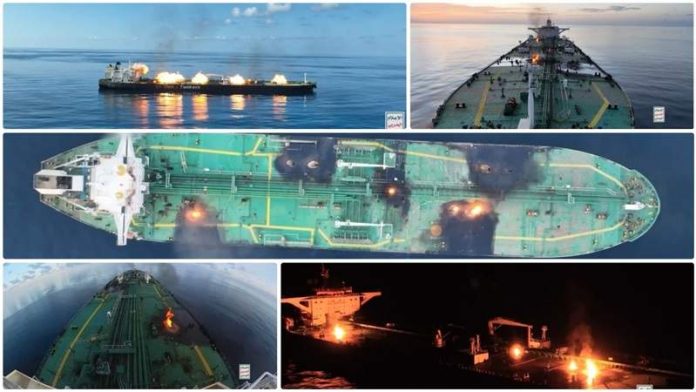The leader of the revolution, Sayyed Abdulmalik Al-Houthi revealed on Thursday the details of the operation targeting the ship Sounion, confirming that it was boarded by Yemeni naval forces during the operation.
This was showcased in a series of powerful images broadcast by the military media, representing a significant blow to the Zionist enemy and its Western sponsors, who once again were exposed as powerless in the face of the Yemeni front supporting Gaza. The images, along with new confessions, confirmed the absence of any American or British warships in the Red Sea. However, the matter does not stop there; the leader promised more unexpected surprises for the enemy.
In his new weekly speech, the leader disclosed that two teams from the naval forces boarded the Greek ship Sounion, whose owner violated the embargo decision, in two stages and operations. During these operations, the cargo the ship was carrying for the enemy was destroyed, and the vessel was rigged with explosives. He described the operation as “brave and courageous.”
The footage later aired by the military media fully captured this description, showing Yemeni naval forces boarding the massive ship, setting it ablaze, and rigging its main deck with explosives. The footage also displayed the direct hits sustained by the ship during its pursuit.
These images were paralleled with official confirmations from the so-called European Operation Aspides in the Red Sea, stating that the ship had been burning for a week.
The footage clearly demonstrated that Yemeni naval forces now possess not just firepower but actual control over the Red Sea, enabling them to carry out direct boarding and pursuit operations against ships violating the embargo.
This represents a strategic, unprecedented achievement, especially considering that the Yemeni Armed Forces do not possess traditional warships and operate with limited resources due to the aggression and blockade. The operation was conducted 77 nautical miles from Hodeidah (over 140 kilometers) according to the British Navy, a considerable distance for a direct boarding and pursuit operation without large warships. Despite this, the military media footage showed that the Yemeni naval forces were highly prepared and displayed extraordinary readiness, as if they performed such actions regularly.
This was also confirmed by a recent American acknowledgment published by Axios, which confirmed the absence of any American warships in the Red Sea. The British newspaper The Telegraph, had earlier indicated this, adding that there were no British warships in the region either. This clearly indicates that the Yemeni Armed Forces have defeated the American-British coalition at sea, and after the coalition amassed its fleets to deter Yemen (the United States had 12 warships in the Red Sea), it can no longer even approach the Yemeni operations area.
This success in maintaining the initiative and imposing and stabilizing equations along the confrontation line represents a historic and resounding failure for the United States and its Western partners, who have been completely unable to influence the course of operations despite all their resources.
This achievement in asserting actual control over the Red Sea operations theater provides a solid and stable foundation for further successes, with an open horizon on several fronts, including the upcoming retaliation for the attack on Hodeidah. The leader confirmed in his latest speech that preparations for this retaliation are still ongoing and that its timing will be a surprise to the enemy. He also emphasized that the response will not be limited to this; the Yemeni front supporting Gaza is looking to escalate further and increase the operational impact. He stressed that there are no political ceilings or considerations that could limit or affect support operations.
In this context, the leader announced that Yemeni capabilities are continuously developing and that “upcoming surprises are beyond the enemy’s expectations and not at all anticipated.” This announcement clearly goes beyond psychological warfare, as it is based on tangible achievements that have demonstrated, both in sound and image, the ability to create unprecedented shifts that the enemies did not expect, as evidenced by the recorded events of the Red Sea battle, which occurred for the first time in history since World War II.
The Yemeni Armed Forces have proven that their ability to create surprises spans multiple aspects, not only introducing new weapons into the confrontation but also inventing tactics and strategies that the enemies do not expect. This makes it extremely difficult for the enemies to anticipate or prepare for these surprises, despite their resources.
Just a few days ago, the former commander of the American aircraft carrier group Eisenhower, Mark McGhee, admitted that the U.S. Navy did not expect what it faced in the Red Sea. He stated in remarks on YouTube: “The enormous number of drone engagements we encountered was something we had not trained for comprehensively… not at the level we had to face in combat,” according to the American magazine Maritime Executive.
McGhee admitted that the U.S. aircraft carrier Eisenhower fled Yemeni strikes, which the United States had previously tried to deny. He said he “had to move the carrier several times to protect it.”
These statements, adding to a long list of acknowledgments of failure, incapacity, and retreat, make the leader’s announcement of upcoming surprises even more impactful on the enemy, as it now clearly understands the seriousness of the Yemeni leadership in pushing the engagement to the utmost possible limit. The enemy also realizes this leadership’s ability to always invent new options to increase the effectiveness and intensity of operations, imposing new equations that multiply the scale of its failure and incapacity and leaving it increasingly exposed and vulnerable to greater harm over time.
Sana’a Permits the Towing of the Burning Ship; Washington Obstructs:
In a related context, Sana’a announced that it had allowed the towing of the ship Sounion, reaffirming its commitment to maritime safety and environmental protection, despite the fact that the ship’s targeting did not result in any oil spill, as confirmed multiple times by European Operation Aspides.
Mohammed Abdulsalam, head of the national delegation, said on Wednesday that “after contact from several international parties, particularly the Europeans, permission was granted to tow the burning oil ship Sounion.”
He added that “the burning of the aforementioned oil ship is an example of Yemen’s seriousness in targeting any ship that violates the Yemeni embargo decision prohibiting the passage of any ship to the ports of occupied Palestine. This aims to pressure the Zionist enemy to stop its aggression against Gaza. All maritime shipping companies associated with the Zionist enemy should realize that their ships will remain vulnerable to Yemeni strikes wherever the Yemeni Armed Forces can reach them until the aggression ceases and the blockade on Gaza is lifted.”
However, the British newspaper Lloyd’s List revealed that the United States is obstructing the ship’s towing operation because the tugs contracted by the ship’s insurance company are subject to American sanctions and will not be able to carry out their work without permits from the U.S. State Department. This confirms that the U.S. claims about caring for maritime environmental safety are mere propaganda.




















